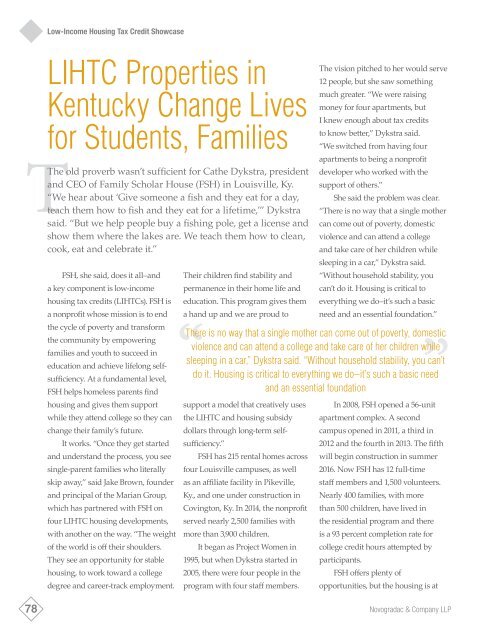LOW-INCOME HOUSING TAX CREDIT SHOWCASE
novogradac_lihtc_showcase
novogradac_lihtc_showcase
You also want an ePaper? Increase the reach of your titles
YUMPU automatically turns print PDFs into web optimized ePapers that Google loves.
Low-Income Housing Tax Credit Showcase<br />
LIHTC Properties in<br />
Kentucky Change Lives<br />
for Students, Families<br />
T<br />
The old proverb wasn’t sufficient for Cathe Dykstra, president<br />
and CEO of Family Scholar House (FSH) in Louisville, Ky.<br />
“We hear about ‘Give someone a fish and they eat for a day,<br />
teach them how to fish and they eat for a lifetime,’” Dykstra<br />
said. “But we help people buy a fishing pole, get a license and<br />
show them where the lakes are. We teach them how to clean,<br />
cook, eat and celebrate it.”<br />
FSH, she said, does it all–and<br />
a key component is low-income<br />
housing tax credits (LIHTCs). FSH is<br />
a nonprofit whose mission is to end<br />
the cycle of poverty and transform<br />
the community by empowering<br />
families and youth to succeed in<br />
education and achieve lifelong selfsufficiency.<br />
At a fundamental level,<br />
FSH helps homeless parents find<br />
housing and gives them support<br />
while they attend college so they can<br />
change their family’s future.<br />
It works. “Once they get started<br />
and understand the process, you see<br />
single-parent families who literally<br />
skip away,” said Jake Brown, founder<br />
and principal of the Marian Group,<br />
which has partnered with FSH on<br />
four LIHTC housing developments,<br />
with another on the way. “The weight<br />
of the world is off their shoulders.<br />
They see an opportunity for stable<br />
housing, to work toward a college<br />
degree and career-track employment.<br />
Their children find stability and<br />
permanence in their home life and<br />
education. This program gives them<br />
a hand up and we are proud to<br />
support a model that creatively uses<br />
the LIHTC and housing subsidy<br />
dollars through long-term selfsufficiency.”<br />
FSH has 215 rental homes across<br />
four Louisville campuses, as well<br />
as an affiliate facility in Pikeville,<br />
Ky., and one under construction in<br />
Covington, Ky. In 2014, the nonprofit<br />
served nearly 2,500 families with<br />
more than 3,900 children.<br />
It began as Project Women in<br />
1995, but when Dykstra started in<br />
2005, there were four people in the<br />
program with four staff members.<br />
The vision pitched to her would serve<br />
12 people, but she saw something<br />
much greater. “We were raising<br />
money for four apartments, but<br />
I knew enough about tax credits<br />
to know better,” Dykstra said.<br />
“We switched from having four<br />
apartments to being a nonprofit<br />
developer who worked with the<br />
support of others.”<br />
She said the problem was clear.<br />
“There is no way that a single mother<br />
can come out of poverty, domestic<br />
violence and can attend a college<br />
and take care of her children while<br />
sleeping in a car,” Dykstra said.<br />
“Without household stability, you<br />
can’t do it. Housing is critical to<br />
everything we do–it’s such a basic<br />
need and an essential foundation.”<br />
There is no way that a single mother can come out of poverty, domestic<br />
violence and can attend a college and take care of her children while<br />
sleeping in a car,” Dykstra said. “Without household stability, you can’t<br />
do it. Housing is critical to everything we do–it’s such a basic need<br />
and an essential foundation<br />
In 2008, FSH opened a 56-unit<br />
apartment complex. A second<br />
campus opened in 2011, a third in<br />
2012 and the fourth in 2013. The fifth<br />
will begin construction in summer<br />
2016. Now FSH has 12 full-time<br />
staff members and 1,500 volunteers.<br />
Nearly 400 families, with more<br />
than 500 children, have lived in<br />
the residential program and there<br />
is a 93 percent completion rate for<br />
college credit hours attempted by<br />
participants.<br />
FSH offers plenty of<br />
opportunities, but the housing is at<br />
78 Novogradac & Company LLP


